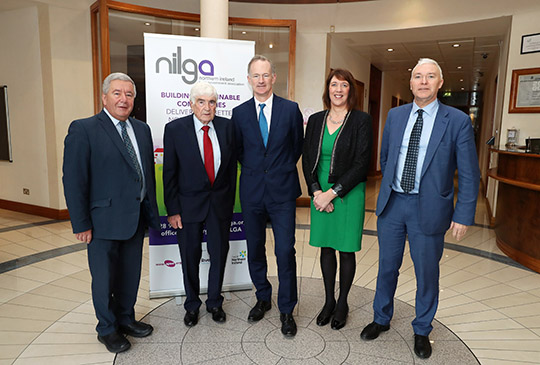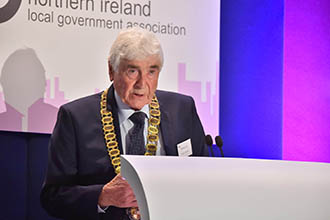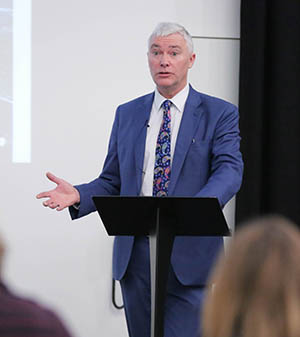Councils with more resources and powers can bring a stronger economy and greater local democracy to NI says NILGA.

Alderman Alan McDowell; NILGA Vice President, Councillor Dermot Curran; NILGA President, John Penrose MP; Minister of State for Northern Ireland, Alderman Freda Donnelly; NILGA Vice President; Derek McCallan. NILGA, Chief Executive.
The Northern Ireland Local Government Association (NILGA) has called for Government to wake up to the facts that local people and local councils possess the entrepreneurial ability and solutions we need to address our economic, social and legislative deficits.
NILGA seeks three immediate and linked actions after the May 2019 elections.
* Firstly, that the role of councils is formally reviewed and strengthened, giving greater decision taking powers to local people and places.
* Secondly, that in keeping with the Northern Ireland Affairs Committee Westminster report on devolution here, at the end of 2018, an independent panel is set up to take forward how devolution is progressed and funded below Stormont, to councils and communities.
* Thirdly, that a Brexit Support Fund, offered to all councils in England, Scotland and Wales, to the tune of over £60 million to date, is provided to all 11 councils here.
NILGA’s cross party, all council team has in recent days met with John Penrose MP, Minister of State in for Northern Ireland, in order to look at how councils’ additional pressures to deliver are funded, as well as forward planning how Northern Ireland’s £21 billion public purse is given local, democratic scrutiny until the Assembly returns.

Councillor Dermot Curran, President of NILGA said: “Councils in 2019 are faced with huge expectations on their time and expenditure, in part due to the suspension of the Assembly, Brexit, transfer of responsibilities like event traffic management – costing around £900,000 this year alone to ratepayers – without being offered budgets to deliver.
“Similarly, senior management teams in councils are meeting weekly to determine how they can respond to diverse performance management demands of many Government Departments, despite calling for a Single Performance Framework where all public bodies work to national goals and standards. All 11 councils in Northern Ireland take performance management extremely seriously but seek to operate in a citizen driven performance regime, aligned to Scotland and Wales.
“During the continued political impasse, councils are delivering more with less, taking on major infrastructure work as well as substantial, community led, preventative health work. Coupled with the burden of meeting arbitrary targets, councils, the smallest part of the public sector, are being asked to take on more responsibility as the only functioning level of government in Northern Ireland, without the offer of additional resources required.”
With support from elected members and Chief Executives across the councils in Northern Ireland, who are deeply concerned about their ability to deliver against these often outmoded targets, sparse funding and unrealistic expectations and with a new four year electoral term commencing in just ten weeks’ time, NILGA is calling for:
* An immediate review of this and other legislative matters, including implementing a new Code of Conduct;
* A more effective and equitable rating system and;
* Clear guidance on standing orders of councils.

Derek McCallan, Chief Executive of NILGA said: “For well over two years, the 11 councils here have been the only fully functioning democratically elected government in Northern Ireland. Despite not being granted any additional powers or proper resources, in that period, they are under increasing pressure to deliver more.
“Due to the current situation, members and Chief Executives across the 11 councils are becoming increasingly concerned about their ability to deliver on these targets, with the threat of tick box bureaucracy in the background. Enough is enough.
“This is why NILGA is calling for devolved political scrutiny of how we as councils are funded, what the deficits are, and enabling a piece of legislation to get us on a proper democratic and value for money footing.
“These aren’t political or ideological matters, so we can get them sorted. Local government elections take place in a matter of weeks and councils should not have to enter a new mandate over-burdened and under-resourced, trying diligently to deliver on many more expectations from a deserving public.
“This is a reality check and a plea for normality. When our counterparts in England, Wales and Scotland are allocated over £60 million in Brexit support, and we are offered an empty purse and a wish list, it’s time to wise up and give councils and communities the tools and the autonomy to get on with it.
“Local government is a resilient, democratic anchor in Northern Ireland, but cannot be expected to bare burdens which are sent to us without cash and in a manner which is neither efficient nor necessary. Let’s use these elections to give choice, voice and control to communities, through councils.”
























